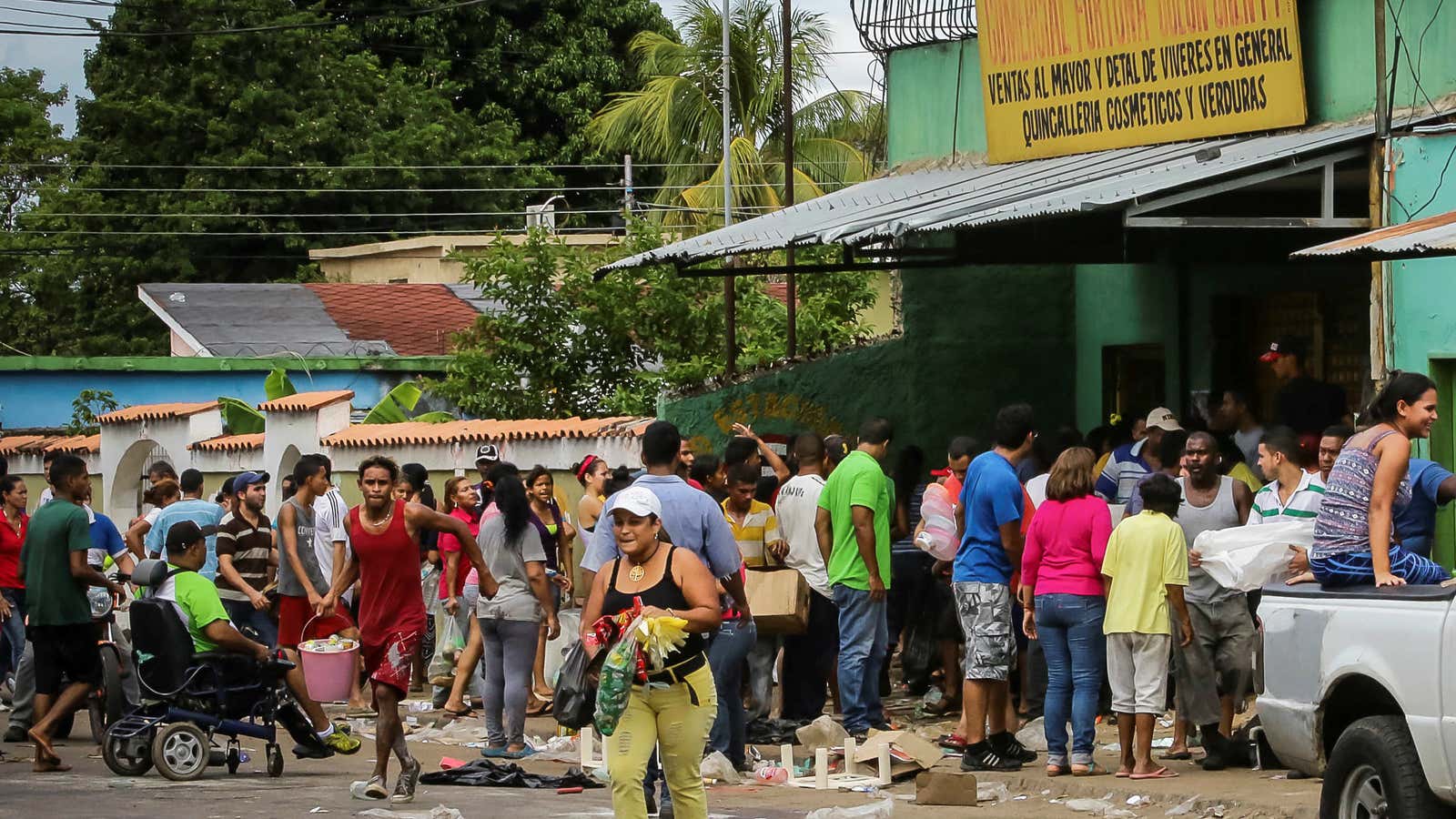Venezuelans can’t say for sure how bad their hyperinflation is, as the government stopped publishing statistics long ago. But they have seen how destructive a force it can be. With prices rising rapidly, and a shortage of dollars making it hard to import even basic necessities, hospitals are short on medical supplies, store shelves are bare, and some residents have illegally crossed the border in search of food.
How does this happen in a country with the largest known oil reserves in the world? In a country that’s literally sitting on a pile of wealth?
It comes down to years of socialist policies and economic mismanagement, including currency devaluations. And the government has worsened the situation by refusing to pay suppliers and seizing private business.
“It’s ineptitude of a scale that’s truly staggering, one of the worst in the world,” says Jan Dehn, head of research at emerging-markets specialist Ashmore Investment Management, which owns Venezuelan debt.
The International Monetary Fund estimates inflation at 475% this year and predicts it to climb to 1,660% next year. And while the government maintains an official currency exchange rate of 10 bolivars to 1 US dollar, the black market rate for dollars has skyrocketed to 2,500 bolivars to the dollar.
For two years, investors have been expecting Venezuela to default on its debt, as the country has a quickly diminishing supply of US dollars. But in choosing between the dollars it does have to pay for imports of food and other basic supplies or paying off its foreign debt, the government has surprisingly chosen to pay its debt.
Venezuelan sovereign bonds are the best performing in the world
There is one small benefit for governments in hyperinflation, which helps keep the economy afloat: the destruction of the value of the country’s debt. The government can just print more and more money to pay off debts. And Venezuela is doing this. Its domestic debt—issued in bolivars— is “not worth the paper it’s written on,” Dehn said. It’s estimated the country has about $60 billion in domestic debt, according to Ashmore, but the runaway inflation makes it hard to give any concrete sense of the real value of this debt.
This isn’t particularly helpful for Venezuela, though, because most of its debt is in dollars. The country has about $139 billion in foreign debt, mostly belonging to the government and to the state-owned oil company Petróleos de Venezuela S.A. (PDVSA). This can’t just be inflated away by printing more bolivars. This year, the government had to spend about $10 billion on all types of debt service payments. In October, PDVSA managed to convince bondholders to swap almost $3 billion of bonds that would have needed to be repaid next year, for debt with longer maturities.
This steadfast determination to pay off its debt has been great for investors. Venezuelan sovereign bonds are the best performing in the world, returning a staggering 51% this year. The country’s dollar bonds have an average yield of 23%. This is a particularly sweet deal as a 35-year bull run in developed market bonds appears to have ended.
But the government’s decision to use its foreign reserves to pay debt instead of paying to import food and other basic necessities is terrible for Venezuelans. So why does it do it?
More than anything, the government is trying to secure the credibility of PDVSA, which is Venezuela’s last lifeline for income. A default would shut down PDVSA’s credit lines from international banks, which it uses to finance oil production. Without the income from producing 2.7 million barrels of oil a day, the government wouldn’t be able to service any of its debt, or pay for subsidies that support some of the poorest Venezuelans. PDVSA is the government’s only source of foreign exchange. Compromising its standing would take away what’s left of the political capital the government is using to cling to power.
“Venezuela is de facto an oil company with a country attached, where the country is becoming increasingly irrelevant,” Ashmore’s Dehn says.
There’s also speculation that the government has a vested interest in paying off the debt because some of it is owned by wealthy Venezuelans and is their means of accessing foreign currency. Dollar-denominated bonds “are an incredibly valuable asset” for the political establishment, Dehn says.
An “impressive commitment”
How this all ends is unclear. Next year, coupon and interest payments will average $100 million a month, S&P forecasts. But Venezuela’s potential wealth is enormous in comparison to its debt. With more than 300 billion barrels of oil, it will benefit from the rebound in oil prices. At the end of the day, it is solvent. To end the crisis, though, there needs to be a drastic change in economic governance. Instead, the government is chaotically pulling the 100-bolivar note and, in a move reminiscent of Germany in the 1920s, it’s issuing higher-denominated banknotes. It’s also blaming private business, foreign governments, and the mafia for the crisis.
S&P ratings analyst Manuel Orozco said that while Venezuela has an “impressive commitment” to pay its debt, a default can still be expected.
But Venezuelan president Nicolás Maduro could still ride this out. With the government escalating its authoritarianism, taking control of the judicial system, and using the army to control economic policymaking and redistribution, Maduro is more in control now than he was a year ago. And that’s despite the economy contracting by an estimated 14% in 2016, according to the Economist Intelligence Unit (EIU).
Zimbabwe sets a precedent for this. Its president, Robert Mugabe, survived hyperinflation that crippled his country at the start of this century and is running for office again at the age of 92.
“I’m surprised at how the Venezuelan society has tolerated that level of hardship,” the EIU’s Rodrigo Aguilera says, “and it’s all been done precisely so they don’t lose that foreign exchange to pay the debt.”
